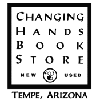- Categories:
Bookstore Cafés, #3: Brewing a Better Bookstore Café
So … you’ve already gone and started a café in your bookstore? And you didn’t wait for our advice? Well, no matter. In this final of three articles on bookstores and coffee, BTW talks with booksellers about strategies for improving existing bookstore cafés. [To read the previous articles in our series, click here.
Perhaps it’s going smoothly, and you’ve improved your store’s ambiance, attracted some new walk-in customers, and, on top of it all, added a little to your bottom line.
Or, maybe, it’s not quite as profitable as anticipated. Profits are stagnant, and, while you’re not exactly losing money, the business is not really growing or adding much to your store. How do you improve things?
 Each bookseller we talked to is still tinkering, always trying to improve the efficiency and profitability of café operations. And some of these strategies aren’t for everyone. A case in point: At Transitions Bookplace in Chicago, owner Howard Mandel reports he uses his bookstore’s IBID inventory system to record café sales. "We created an ISBN for every drink," he said.
Each bookseller we talked to is still tinkering, always trying to improve the efficiency and profitability of café operations. And some of these strategies aren’t for everyone. A case in point: At Transitions Bookplace in Chicago, owner Howard Mandel reports he uses his bookstore’s IBID inventory system to record café sales. "We created an ISBN for every drink," he said.
Sometimes, such involved practices work. Other times, they don’t, but, perhaps, you haven’t had the time or energy to change them. If you’re going to improve café operations, you’ll need to heed James Baldwin’s advice: "Not everything that is faced can be changed, but nothing can be changed until it is faced."
Coffee Profitability
Cafés are subject to the same profitability pressures you’ll find in a bookstore, or any other retail business. In order to increase profits, you’ve got to either increase sales or decrease expenses. Sometimes, just adding new menu items or raising prices will suffice.
![]() "We were selling sandwiches for $4," said John Teague, general manager of Politics & Prose in Washington, D.C., where a bookseller-owned café is being transferred to an independent contractor. "Customers loved it -- who wouldn’t? But we were ignorant of what needed to be done: bringing in someone who knows what they’re doing, raising prices, changing the menu."
"We were selling sandwiches for $4," said John Teague, general manager of Politics & Prose in Washington, D.C., where a bookseller-owned café is being transferred to an independent contractor. "Customers loved it -- who wouldn’t? But we were ignorant of what needed to be done: bringing in someone who knows what they’re doing, raising prices, changing the menu."
On the other side of the equation, you might be tempted to reduce costs. But by buying cheaper or paying employees less, you risk decreasing quality. Bill Kramer, who founded Washington D.C.’s Kramerbooks & Afterwords in 1976, was one of the first to recognize the potential of combining a first-rate general bookstore with a full-service café-restaurant. Kramer believes that, just as in independent bookselling, attention to quality and selection are the keys to getting repeat customers in the coffee and food business. "People still do value quality," said Kramer. "That means putting the book they want in their hands immediately, and knowing what to recommend when asked, or providing consistently well-prepared food at a reasonable cost in a welcoming atmosphere. People know these things cost money and they are happy to pay."
 Similarly, the cheapest suppliers of food and equipment might actually cost your business in the long run. "Look for a vendor who’ll provide you with good service, not just lowest cost," recommended Philip Rafshoon of Outwrite Bookstore & Café in Atlanta.
Similarly, the cheapest suppliers of food and equipment might actually cost your business in the long run. "Look for a vendor who’ll provide you with good service, not just lowest cost," recommended Philip Rafshoon of Outwrite Bookstore & Café in Atlanta.
But if you still determine that the operation needs to cut costs, ensure that you keep accurate records of your labor-cost goals, and spend a small amount of time each day comparing these to actual labor costs. Keep your target in sight.
 In the January 2000 issue of Fresh Cup magazine [entitled An A to Z Guide to Opening a Coffeehouse, available at www.freshcup.com or (800) 868-5866], consult the article on operational systems. It covers advice on setting up opening/closing checklists, putting in place labor controls, keeping a vendor invoice log, and accurately tracking your cost of goods
In the January 2000 issue of Fresh Cup magazine [entitled An A to Z Guide to Opening a Coffeehouse, available at www.freshcup.com or (800) 868-5866], consult the article on operational systems. It covers advice on setting up opening/closing checklists, putting in place labor controls, keeping a vendor invoice log, and accurately tracking your cost of goods
"Would you like a Seabiscuit with that mocha?"
Of course, another way to boost profits is to sell more products. That’s always a challenging goal -- for both booksellers or coffee purveyors -- but keep reminding your employees to keep this goal in mind. "Sales is sales," said Outwrite’s Rafshoon. "It doesn’t matter if you’re trying to sell another cappuccino, add on a pastry, or sell another book. Upselling is the key." Rafshoon also creates small book displays -- usually a book featured on the Today Show -- in his coffee bar to try to encourage that one extra impulse buy.
 Such cross-marketing and coordination between bookstore and café can also help increase sales. Author appearances are the obvious way to draw customers to both café and bookstore. According to owner Mitchell Kaplan, an appearance by maverick chef Anthony Bourdain brought over 150 customers to Books & Books in Coral Gables, Florida -- both to the bookstore and to its full-service restaurant.
Such cross-marketing and coordination between bookstore and café can also help increase sales. Author appearances are the obvious way to draw customers to both café and bookstore. According to owner Mitchell Kaplan, an appearance by maverick chef Anthony Bourdain brought over 150 customers to Books & Books in Coral Gables, Florida -- both to the bookstore and to its full-service restaurant.
However, keep in mind that sometimes a big event can actually hamper your coffee sales. Howard Mandel reports that his small coffee bar has to essentially shut down to accommodate readings that attract more than 50 customers. You’ll need to balance what’s more important: profit on several dozen hardcover books or an evening’s latté sales.

Some booksellers have shown immense creativity in cross-marketing books and coffee. But we’re not convinced everyone should follow Howard Mandel’s example: "We put day-old chocolate cake on the remainders table," he admitted in a recent interview. Whatever works.
A Cautionary Tale
It might be appropriate here to mention something about bookstore-coffee combinations that didn’t work out. Bookselling and coffee are two very different businesses, and success as a bookseller doesn’t guarantee success as a coffee shop owner. And if you’re struggling as a bookseller, adding a café will most likely just increase your headaches. "I’ve seen, over the years," said Bill Kramer, "a number of booksellers try to enter the café business as a way to rescue a failing book business. It rarely works."
Gee Gee Rosell, the owner of a successful store -- Buxton Village Books in Buxton, North Carolina -- decided to open two satellite stores with cafés several years ago. In an e-mail to BTW, she wrote:
"For one café I leased the total bookstore/café space and sub-let to the café operators. I paid their rent 60 percent of the time (since I was on the hook for it) while they and their revolving employees smoked pot out on the back deck. In the other location, we had separate leases with an adjoining French door. The café packed up and left town in the middle of the night. Both locations were lovely architecturally and both cafes served great coffee. I spent more time dealing with the café disasters than I did running any of the three stores. The morale of my employees suffered, not to mention the huge financial dig my business sustained. Customers loved the coffee/bookstore combo but complained that my staff and I were much less attentive than we had always been -- and we were. Obviously there is a way to run a good combo, but I didn’t experience it."
Coffee can be a profitable addition to a bookstore, but it’s a proposition you’ll have to thoroughly research and carefully analyze. Go into it with eyes wide open, and perhaps another double-shot skinny vanilla latté. --Andrew Engelson

